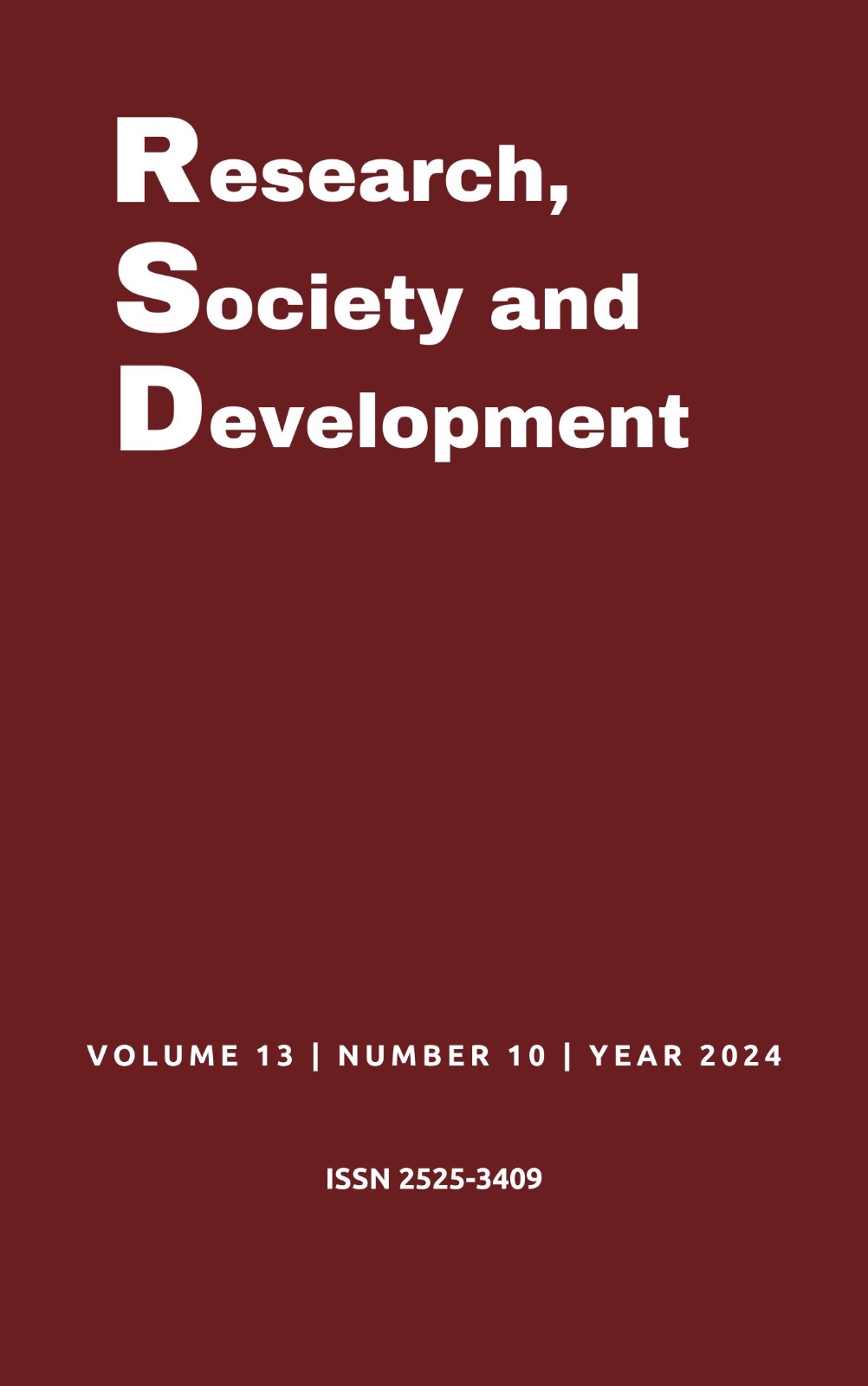Digital information and communication technologies used in Music teaching in Basic Education: An integrative literature review
DOI:
https://doi.org/10.33448/rsd-v13i10.46982Keywords:
Digital technologies, Teacher training, Music, Teaching.Abstract
The study focuses on the use of Digital Information and Communication Technologies (DICT) in music teaching. Objectives: to analyze the difficulties faced by teachers in relation to the use of digital information and communication technologies in music teaching in basic education and describe their contributions. This is a qualitative, descriptive study that was based on the database in the field of education (WoS, SCOPUS and ERIC). The search limits were defined as publications from 2017 to 2023 in English, Portuguese and Spanish, using the following criteria: articles available in full and with free access. Review articles, case reports, clinical trials, TCC, master's dissertations, doctoral theses, books, book chapters, works published in annals and articles inconsistent with the theme were excluded. In the search for production, the following descriptors were used: digital technologies and teaching; digital technologies and music; music and training; music and teaching. Results: the challenges faced by teachers in the use of DICT in basic education refer to the need for training and appropriation of pedagogical strategies that optimize their use, whose contributions are anchored in the advancement of knowledge in the theoretical and practical fields. Conclusion: when teachers use DICT in music teaching, they create an environment conducive to learning, participation, exchange of experiences and development of students' skills by referring to the context permeated by digital culture.
Downloads
References
Aristides, M. A. M., & Santos, R. M. S. (2018). Issue about digital technologies in the music learning and teaching process. Revista da Abem, 26(40): 91-113. https://doi.org/10.33054/ABEM2018a4006.
Arroyo, M, Bechara., S. R. C. C., & Parmann, H. (2017). Educação musical, jovens e pesquisa na internet: compartilhando procedimentos metodológicos. OPUS, 23(3):67-90. http://dx.doi.org/10.20504/opus2017c2304.
Barros, M. H. F., & Almeida, C. M. G. (2019). Saberes Docentes relacionados às tecnologias na formação de professores de Música. Ouvirouver, 15(1): 30-42. http://dx.doi.org/10.14393/OUV24-v15n1a2019-2.
Bellochio, C. (2016). Formação de professores de música: desafios éticos e humanos para pensar possibilidades e inovações. Revista da Abem, 24(36): 8-22. http://dx.doi.org/10.14393OUV24-v15n1a2019-2.
Beltrame, J. A. (2018). Práticas e aprendizagens de produtores musicais: aspectos de uma educação musical emergente na cultura digital e participativa. Revista da Abem, 26(41): 40-55. http://dx.doi.org/10.33054/ABEM2018b4103.
Borges, A. S., & Richit, A. (2020). Development of teaching knowledge to teach music in elementary school. Cad. Pesqui, 50(176). https://doi.org/10.1590/198053146782.
Castellon, L. A. S., Cavalcanti, J. B., De Souza, R. A. D. C., & Dantas, F. G. (2021). Investigation of alterations in temporal perception due to the presence of high levels of smartphone dependence. Research, Society and Development, 10(12) e466101220870. https://doi.org/10.33448/rsd-v10i12.20870.
Cernev, F. K. (2018). Musical Collaborative Learning mediated by digital technologies: a methodological perspective for teaching music. Revista da Abem, 26(40):23-40. https://doi.org/10.33054/ABEM2018a4002.
Chamorro, A., Gitahy, R. R. C., Terçariol, A. A. L., & Santos, D. A. N. (2017). Educação musical e as tecnologias digitais: o uso de objetos de aprendizagem e a percepção dos docentes. Revista Educação e Linguagem, 6(11). https://doi.org/10.33871/22386084.2017.6.11.17-43.
Chu, H. S., Tak, Y. R., & Lee, H. (2021). Exploring psychosocial factors that influence smartphone dependency among Korean adolescents. Plosone,15(5): e0232968. https://doi.org/10.1371/journalo.pone.0232968.
Colabardini, J. C. M. (2022). Teaching and learning music in digital culture: beliefs and conceptions of students in a music degree course. Revista da Abem, 30(1). https//doi.org/10.33054/ABEM202230104.
Cuervo, L. C., Welch, V. F., Malffioletti., & L. A, Reategui, E. (2019). Digital culture and teaching: possibilities for music education. Acta Educ, 41: e34442. https://doi.org/10.4025/actascieduc.v40i1.34442.
Cuervo, L., Bonastre, C., & García, D. (2022). Tecnología digital en la educación musical infantil. Praxis & Saber, 13(32):e13201. https://doi.org/10.19053/22160159.v13.n32.2022.13201.
Ferreira, J. L. (2020). A cultura e formação de professores: uma análise a partir da perspectiva dos discentes da Licenciatura em pedagogia. Educ. rev, 36. https://doi.org/10.1590/0104-4060.7587.
Fucci-Amato, R. (2015). Escola e educação musical: (Des) caminhos históricos e horizontes. Campinas, SP: Papirus.
Garcia, M. R., Beltrame, J. A., Araújo, J. M, M., & Marques, G. L (2020). The theme of technologies and music education: an integrative review of ISME’s international events publications between 2010 and 2018. Revista da Abem, 28:28-45. https://doi.org/10.33054/ABEM20202802
Gonçalves, S., Dias, P., & Correia, A. P. (2021). Nomophobia and lifestyle: Smartphone use and its relationship to psychopathologies. Computers in HumanBehavior Reports, 2(2):100025. https://doi.org/10.1016/j.chbr.2020.100025
Leite, R. J. L., Welter, M. M., Barreto, L.K.L., Gonçalves, D. M., & Rocha Neto, M. P. (2020). Is it possible to survive without the cellphone? A bibliographical review on the nomophobia theme Revista Espacios, 41(3). chrome-extension://efaidnbmnnnibpcajpcglclefindmkaj/https://www.revistaespacios.com/a20v41n03/a20v41n03p11.pdf.
Minayo, M. C. S. (2014). O desafio do conhecimento: pesquisa qualitativa em saúde. (14a. ed.). Hucitec.
Souza, K. N. M., & Cunha, M. R. S. (2018). Nomofobia: o vazio existencial. Revista Psicologia PT, 1-12. http://www.psicologia.pt/artigos/textos/A1166.pdf.
Souza & Bonilla (2015). A cultura digital na formação dos professores. Revista Tempos E Espaços Em Educação, 7(14):23–34. https://doi.org/10.20952/revtee.v0i0.3447.
Veloso, F. (2020). Improvisação e o ensino de música: aportes à prática docente. Curitiba: Intersaberes.
Weijia, W. (2022). Digital Technologies in Music Education: The Case of Chinese Students. Hodie Journal, 22(1):402-23. https://doi.org/10.5216/mh.v22.70752.
Downloads
Published
Issue
Section
License
Copyright (c) 2024 Julio Cezar Lopes dos Santos; Jacson Azzini; Elias Barbosa de Oliveira

This work is licensed under a Creative Commons Attribution 4.0 International License.
Authors who publish with this journal agree to the following terms:
1) Authors retain copyright and grant the journal right of first publication with the work simultaneously licensed under a Creative Commons Attribution License that allows others to share the work with an acknowledgement of the work's authorship and initial publication in this journal.
2) Authors are able to enter into separate, additional contractual arrangements for the non-exclusive distribution of the journal's published version of the work (e.g., post it to an institutional repository or publish it in a book), with an acknowledgement of its initial publication in this journal.
3) Authors are permitted and encouraged to post their work online (e.g., in institutional repositories or on their website) prior to and during the submission process, as it can lead to productive exchanges, as well as earlier and greater citation of published work.


